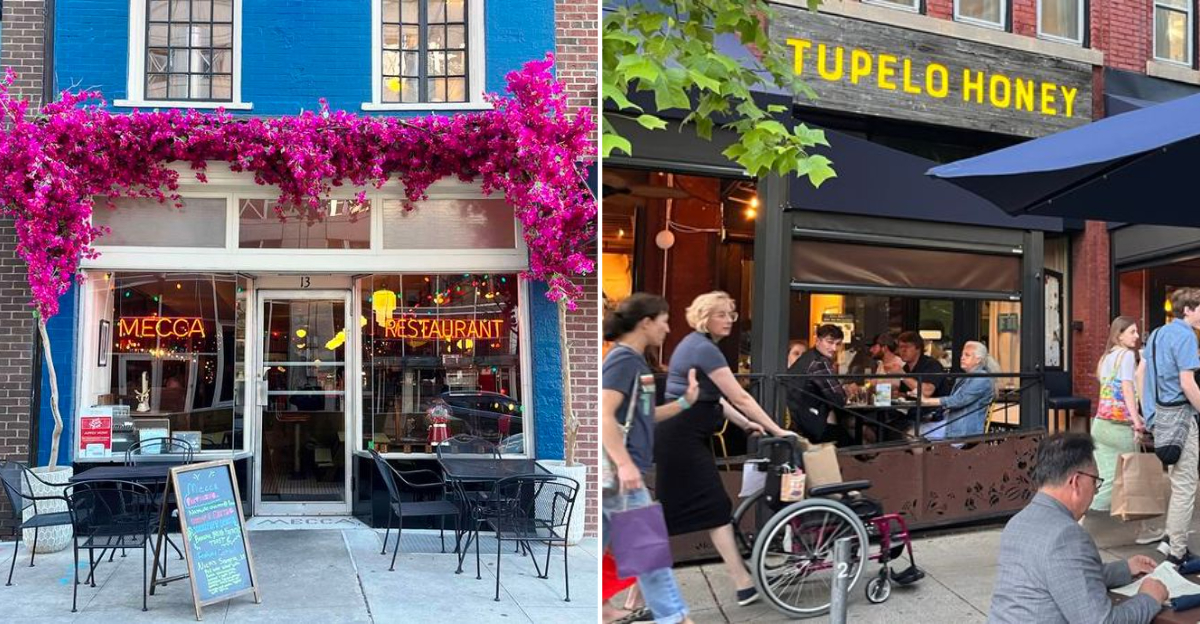5 North Carolina Restaurants With Old-School Charm & 5 That Are Just Outdated

North Carolina’s restaurant landscape is a blend of timeless favorites and places that feel stuck in the past. Some spots have held onto their old-school charm while continuing to serve up top-notch food and warm hospitality.
Others, though, seem to rely more on nostalgia than quality, falling behind as tastes and standards evolve. Here’s a look at which beloved NC eateries are still worth the hype, and which ones could use a fresh start.
1. Carolina Coffee Shop (Chapel Hill)
Holding the crown as North Carolina’s oldest continually running restaurant since 1922, this Chapel Hill landmark exudes authentic collegiate charm.
Original wooden booths and vintage countertops transport diners back to simpler times while the menu blends traditional favorites with contemporary touches.
I still remember my grandfather telling stories about his first date with my grandmother here in the 1950s – the same booths remain, along with that unmistakable sense of history in every corner.
2. Sutton’s Drug Store (Chapel Hill)
Walking into Sutton’s feels like stepping through a time portal to 1923. Red vinyl booths line walls plastered with decades of UNC photos and memorabilia.
The soda fountain still churns out hand-spun milkshakes that haven’t changed their recipe in generations.
Beyond the famous burgers and hot dogs, Sutton’s magic lies in its refusal to chase trends – the worn countertops and friendly faces behind them tell stories no modern restaurant could replicate.
3. Time-Out Restaurant (Chapel Hill)
Midnight cravings in Chapel Hill have one legendary solution – Time-Out’s chicken and cheddar biscuits served 24/7 since 1978. The fluorescent-lit diner hasn’t changed its no-frills approach or soul food menu in decades.
Students stumble in at 3 AM while early birds arrive for breakfast, creating a unique cross-section of Chapel Hill life.
During my college days, Time-Out was our post-concert ritual – those heavenly biscuits tasted even better after midnight!
4. The Mecca Restaurant (Raleigh)
Greek immigrants opened this downtown Raleigh institution in 1930, and their legacy lives on through perfectly seasoned country ham and red-eye gravy.
The narrow dining room with original tile floors, vintage booths, and weathered counters hasn’t seen major updates in decades – and that’s precisely its charm.
Politicians, judges, and local characters have been solving the world’s problems over coffee here for generations, creating an atmosphere no designer could manufacture.
5. Clyde Cooper’s (Raleigh)
Smoke has been rising from Clyde Cooper’s pits since 1938, making it one of North Carolina’s barbecue landmarks. The chopped Eastern-style pork remains faithful to tradition – vinegar-based and perfectly tender. Pig illustrations and vintage signs cover every available wall space.
Even after relocating from its original location, Cooper’s transported its soul and recipes intact, proving that authentic barbecue transcends trendy food movements and fancy surroundings.
6. Tupelo Honey Café (Multiple NC Locations)
What began as Asheville’s charming Southern kitchen has morphed into a chain restaurant disguised as a local gem. Honey-drizzled biscuits arrive with corporate efficiency rather than grandmotherly love.
The farm-to-table aesthetic feels calculated rather than authentic. Wooden signs with folksy sayings can’t hide the standardized experience that’s identical whether you’re in Charlotte or Raleigh.
The food remains decent but lacks the soul and creativity that made the original location special.
7. Lineberger’s Cattle Company (Sherrills Ford)
The log cabin exterior promises rustic charm, but inside, Lineberger’s feels trapped in a 1980s steakhouse time warp. Dated carpeting absorbs decades of stories while faded wildlife prints hang askew on knotty pine walls.
The menu hasn’t evolved beyond iceberg wedge salads and baked potatoes wrapped in foil. My uncle insists we visit annually for his birthday, clinging to tradition while younger family members exchange knowing glances about the tired offerings.
8. The Beefmastor Inn (Wilson)
Ribeye enthusiasts make pilgrimages to this tiny roadside spot where the meat ritual remains unchanged since the 1960s. A server presents a raw ribeye slab for approval before cooking. But the rigid format feels increasingly out of touch.
No reservations, limited sides, and absolutely no vegetarian options make it inaccessible to many modern diners.
The cramped interior with worn vinyl chairs hasn’t seen updates in decades, relying solely on meat quality to excuse its stubborn refusal to evolve.
9. Clayton Steakhouse (Clayton)
Clayton’s downtown revival deserved better than this uninspired steakhouse that hasn’t updated its concept since opening. Beige walls, generic artwork, and tired leather booths create an atmosphere devoid of personality.
The menu reads like a steakhouse template – predictable cuts with uninspired sides. While technically functional, nothing distinguishes it from chain restaurants except slightly higher prices.
Younger residents flock to Clayton’s newer establishments while the Steakhouse serves an increasingly gray-haired clientele.
10. Bin 54 (Chapel Hill)
Sleek leather, dark wood, and impressive wine displays create a contemporary steakhouse that somehow feels soulless. Bin 54’s carefully calculated luxury misses authentic North Carolina character.
The menu features predictable upscale steakhouse fare at eye-watering prices. Despite technically perfect execution, something feels manufactured about the experience – like dining in an expensive hotel chain rather than a restaurant with local roots.
The polished atmosphere attracts business dinners but lacks the warmth that creates loyal regulars.
